Is Spaghetti Fattening?
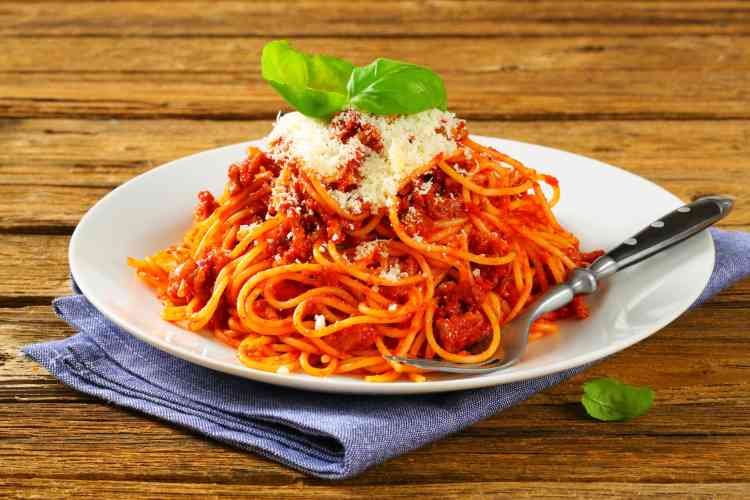
Is spaghetti fattening? This question often sparks debate among health-conscious individuals seeking to balance their love for pasta with their desire to maintain a healthy diet. Spaghetti, beloved by many households, holds a special place on dinner tables worldwide. However, concerns persist regarding whether spaghetti is fattening and unhealthy, with some fad diets suggesting that spaghetti is fattening.
In this article, we discuss the question of whether spaghetti deserves its reputation as a food that contributes to weight gain or if it can indeed be enjoyed as part of a balanced diet. So, is spaghetti fattening or can it be a guilt-free pleasure? Let's find out.
Jump to Section
What Is Spaghetti?
Spaghetti, the slinky staple of Italian cuisine, is the long, thin type of pasta that we all love to twirl around our forks. Crafted from durum wheat flour, water and, sometimes, eggs, spaghetti has a firm texture that holds sauces well, making it a favorite choice for countless pasta dishes.
The process of creating spaghetti involves mixing the flour with liquids to form a dough. The pasta dough is then passed through a special pasta rolling machine to flatten it and achieve spaghetti’s characteristic string-like shape.
While traditional spaghetti is made from refined white flour, there's a growing appreciation for wholegrain alternatives. Unlike white pasta, which undergoes heavy processing that strips away essential nutrients and fiber, wholegrain spaghetti retains all parts of the wheat kernel, including the bran and germ.
Keeping the wholegrain not only adds a richer, nuttier flavor to the pasta but also ensures it remains a significant source of nutrients such as B vitamins, iron and magnesium, as well as that all-important dietary fiber. As a result, wholegrain spaghetti offers a healthier option for those who seek to incorporate more nutritious elements into their meals, without sacrificing taste or texture.
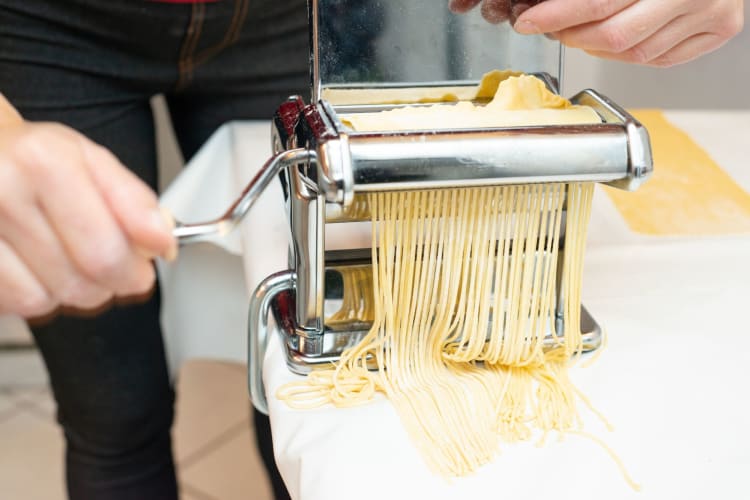
Is Spaghetti Bad for You?
The question of whether spaghetti is bad for you and if spaghetti is fattening ultimately hinges on various factors. While it’s not strictly true that spaghetti is fattening, its nutritional profile can vary significantly depending on factors like preparation methods, portion sizes and accompanying sauces.
When consumed in moderation and as part of a balanced diet, spaghetti can indeed be a satisfying, economical and nutritious meal option. But, is spaghetti fattening or can we pile up our plates? This is where it pays to be wary of portion sizes as spaghetti is one of those dishes that is incredibly craveable.
The question of whether spaghetti is fattening also depends on the sauces and toppings you choose, as they can significantly impact its calorie content. Creamy, cheesy sauces tend to have a higher fat content and contain more calories than tomato-based varieties.
So, is spaghetti fattening? Not necessarily, just be mindful of sauces and portion control. Eating spaghetti alongside plenty of vegetables and lean proteins will ensure that your pasta dishes are well-rounded and part of a balanced diet. If you are unsure about how to start eating healthy while not giving up your favorite spaghetti dishes, there are ways you can enjoy the best of both worlds.
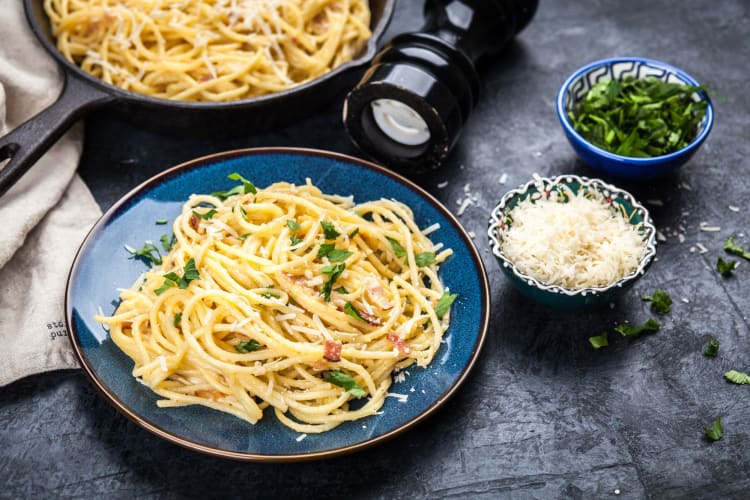
Is Refined Spaghetti Bad for You?
The most prevalent type of pasta consumed globally is refined white pasta, which is made from processed flour stripped of its bran and germ, resulting in a smoother texture and lighter color. There is ongoing curiosity about whether refined spaghetti is bad for you and if we should be eating it.
Many people believe spaghetti is fattening due to its high carbohydrate content. What’s more, indulging in refined carbohydrates like white pasta has been associated with several health concerns. These include elevated blood sugar levels due to the high glycemic index of refined carbohydrates, which can lead to insulin resistance and an increased risk of heart disease.
Additionally, spaghetti is fattening if you are not mindful of portion sizes, as larger amounts of refined white pasta may contribute to weight gain. White spaghetti lacks the fiber and nutrients found in whole grains that promote feelings of fullness and help with weight management.
You might be questioning whether you should be eating pasta at all at this point and want to know: "Is spaghetti unhealthy?" Some individuals even avoid it altogether, fearing it will contribute to weight gain because they believe spaghetti is fattening. However, swapping white pasta out for wholegrain alternatives could be the answer.
Wholegrain varieties can provide you with more nutrients and can reduce the risks associated with excessive refined carbohydrate intake. All in all, enjoying wholegrain spaghetti can help to support better overall health.

Is Whole Wheat Spaghetti Fattening?
So, is spaghetti fattening if we opt for wholegrain varieties? Well, it all boils down to how the pasta is made and what nutrients it offers. As explained above, refined white spaghetti is processed to remove the bran and germ. This gives it that classic creamy white color and smooth, light texture but sacrifices a lot of its fiber and nutrients in the process.
Now, whole wheat spaghetti offers a more natural alternative. Retaining all parts of the wheat kernel gives it a nuttier taste and a denser texture. This heavier quality and nutty flavor may not be ideal for some dishes, such as those with a lighter sauce, however, just think of all the nutrients you will be missing out on, the fiber, vitamins and minerals, if you go for refined spaghetti. Is this a sacrifice you are willing to make?
If you believe refined spaghetti is fattening and are considering switching to whole grain as part of a weight maintenance plan, this doesn't mean you can eat more, in fact, it's quite the opposite. You may find that because of the fiber content, wholegrain spaghetti is more filling so you find yourself eating smaller portions of your favorite dishes than you would usually eat with refined pasta.
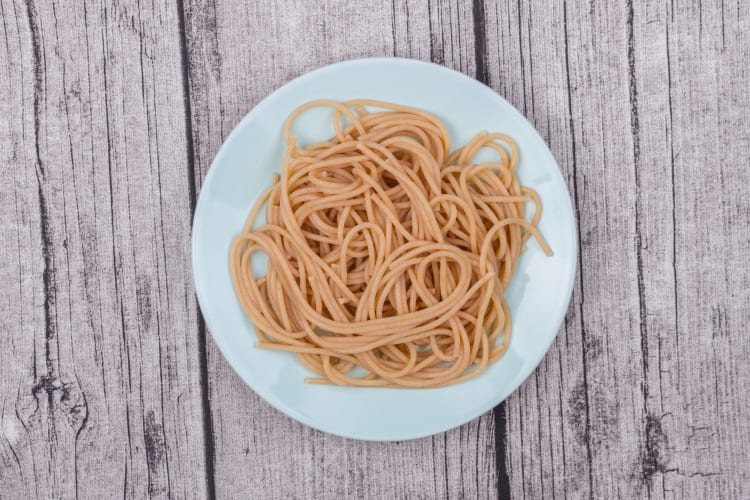
Is Spaghetti Sauce Fattening?
When it comes to dressing up your spaghetti, the sauce you choose can either help or hinder your search for a healthier meal. Let's start with tomato-based sauces like pizzaiola or Tuscan pomarola. Made from sun-ripened tomato passata bursting with flavor, intensified with garlic, onions and a bouquet of herbs, tomato-based sauces offer the best of both worlds. These sauces are low in calories and fat but high in vitamins, minerals and antioxidants, delivering a rich and tangy tomato taste to your spaghetti while nourishing your body from the inside out.
On the other end of the spectrum, we have the more indulgent and calorie-dense sauces such as Alfredo or four-cheese sauces. With their velvety texture and rich flavors, there is no doubt that these creamy, cheesy and buttery sauces are comforting and satisfying. However, if you are managing your weight or have certain health issues that you are mindful of, high-fat sauces are best eaten less frequently as these are the sauces that make spaghetti fattening.
So, is spaghetti fattening when paired with a sauce? As you can see, that depends entirely on its ingredients. Indeed, spaghetti is fattening if the sauce is super indulgent. You can whip up a marinara sauce using fresh tomatoes, garlic, olive oil and a sprinkle of herbs or you can opt for the convenience of a store-bought version, often laden with sugars and sodium. Likewise, you can lighten up an authentic cacio e pepe with a sprinkling of Parmesan and forgo the heavy cream. The choice is completely yours.
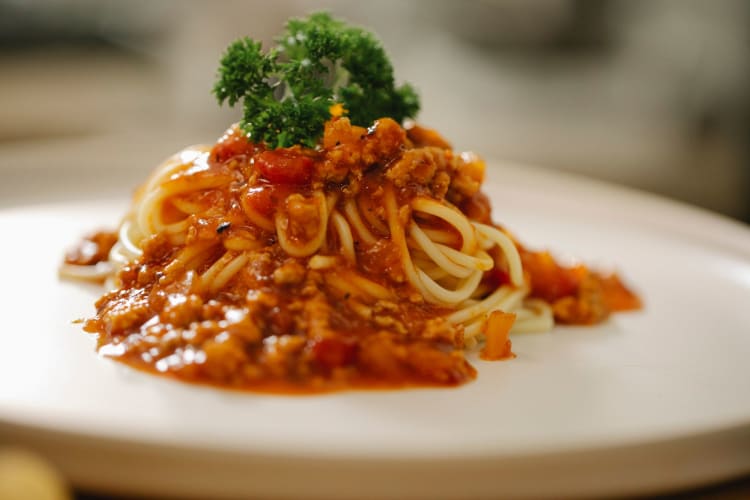
Is Spaghetti Unhealthy?
Contrary to popular belief that spaghetti is fattening, pasta dishes are not inherently unhealthy and can absolutely be part of a balanced diet when consumed in moderation and paired with nutritious toppings. According to the USDA, the recommended portion size for pasta is about 2 ounces, which is roughly equivalent to a cup of cooked spaghetti. Keeping this in mind and your serving size in check is key to enjoying pasta without overdoing it on calories and carbohydrates.
What’s more, you can make your spaghetti dish even more nutritious and satisfying when you serve it with healthy accompaniments. Quash the rumors that spaghetti is fattening and think of it as a blank canvas for creativity, flavor and nourishment. Load up your spaghetti with an abundance of colorful vegetables like tomatoes, bell peppers and avocados in a taco spaghetti fusion food dish, for example, which provides essential vitamins, minerals, antioxidants and anti-inflammatory healthy fats.
Additionally, adding lean protein options such as grilled chicken, turkey or seafood can turn your spaghetti into a complete and balanced meal, supporting muscle health and keeping you feeling full for longer.

What Are the Health Benefits of Spaghetti?
Spaghetti, when prepared with wholesome ingredients and enjoyed as part of a balanced diet, can offer a variety of health benefits that go far beyond the satisfaction of hunger. One of the most notable benefits of spaghetti, especially when made from wholegrain varieties, is its heart-healthy properties.
Wholegrain spaghetti contains fiber, vitamins, minerals and antioxidants that have cardioprotective benefits, such as lowering cholesterol levels, regulating blood pressure and reducing the risk of heart disease. Additionally, the fiber in wholegrain spaghetti ensures you feel fuller for a longer period of time, aiding in weight management and preventing overeating.
When paired with nutritious toppings and sauces, spaghetti can become a delicious and nourishing meal that satisfies both taste buds and nutritional needs. For example, a classic tomato basil pasta made with wholegrain spaghetti and a generous serving of colorful vegetables not only provides essential nutrients but also offers a burst of flavor and texture. The combination of fiber-rich pasta, antioxidant-packed tomatoes and vitamin-rich vegetables creates a dish that supports overall wellbeing while tantalizing the senses.

Ultimately, the question: “Is spaghetti fattening?” is all to do with how you prepare it. Spaghetti is fattening if consumed excessively without considering portion sizes and accompanying ingredients. However, enjoying spaghetti as part of a well-rounded diet that includes a variety of nutrient-dense foods is the key to reaping its benefits without any guilt.
So, next time you're craving a comforting bowl of spaghetti, remember to keep your portion sizes in check and load up on those wholesome toppings for a meal that nourishes both body and soul.
For even more ways to explore your favorite foods, check out other experiences happening on Cozymeal.
